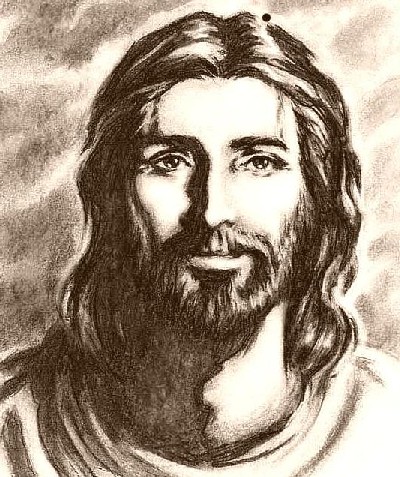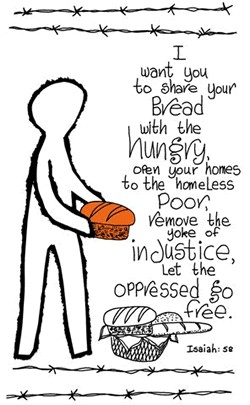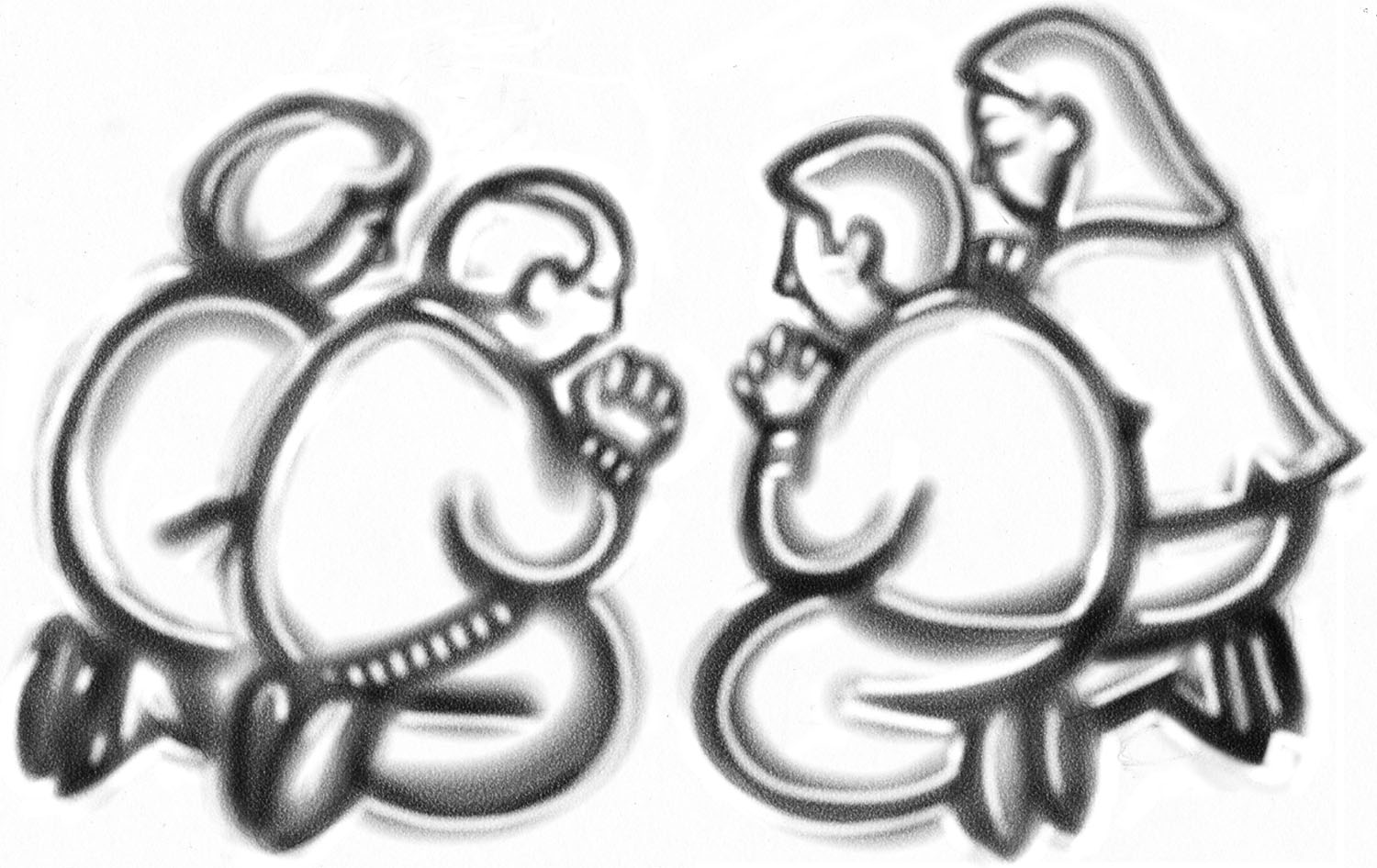

|
|
Intercessory prayer is the act of
praying on behalf of others. The role of mediator in prayer was prevalent in
the Old Testament, in the cases of Abraham, Moses, David, Samuel, Hezekiah,
Elijah, Jeremiah, Ezekiel, and Daniel.........
Christ is pictured in the New Testament as the
Because of Jesus’ mediation, we can now intercede in prayer on behalf of other Christians or for the lost, asking God to grant their requests according to His will...... For there is one God and one mediator
between God and men, the man Christ Jesus (1 Timothy 2:5). Who is he
that condemns? Christ Jesus, who died—more than that, who was raised
to life—is at the right hand of God and is also interceding for us
(Romans 8:34).... A wonderful model of intercessory prayer is found in Daniel 9. It has all the elements of true intercessory prayer. It is in response to the Word (v. 2); characterized by fervency (v. 3) and self-denial (v. 4); identified unselfishly with God’s people (v. 5); strengthened by confession (v. 5-15); dependent on God’s character (vv. 4, 7, 9, 15); and has as its goal God’s glory (vv. 16-19). Like Daniel, Christians are to come to God on behalf of others in a heartbroken and repentant attitude, recognizing their own unworthiness and with a sense of self-denial. Daniel does not say, “I have a right to demand this out of You, God, because I am one of your special, chosen intercessors.” He says, “I'm a sinner,” and, in effect, “I do not have a right to demand anything.” True intercessory prayer seeks not only to know God’s will and see it fulfilled, but to see it fulfilled whether or not it benefits us and regardless of what it costs us. True intercessory prayer seeks God’s glory, not our own........
An intercessor is one who takes the place of another or pleads another's case. One study Bible defines intercession as "holy, believing, persevering prayer whereby someone pleads with God on behalf of another or others who desperately need God's intervention."........ The Biblical basis for the New
Testament believer's ministry of intercessory prayer is our calling
as priests unto God. The Word of God declares that we are a holy
priesthood (1 Peter 2:5), a royal priesthood (1 Peter 2:9), and a
kingdom of priests (Revelation 1:5)....... He stood before God to
minister to Him with sacrifices and offerings. The priests also
stood between a righteous God and sinful man bringing them together
at the place of the blood sacrifice.... Jesus Christ is our model for
intercessory prayer. Jesus stands before God and between Him and
sinful man, just as the Old Testament priests did: It is Christ who
died, and furthermore is also risen, who is even at the right hand
of God, who also makes intercession for us (Romans 8:34). Therefore
He is also able to save to the uttermost those who come to God
through Him, since He always lives to make intercession for them
(Hebrews 7:25)........
Jesus was an intercessor while He was here on earth. He prayed for those who were sick and possessed by demons. He prayed for His disciples. He even prayed for you and me when He interceded for all those who would believe on Him. Jesus continued His ministry of intercession after His death and resurrection when He returned to Heaven. He now serves as our intercessor in Heaven........
Jesus brings sinful man and a righteous
God together at the place of the blood sacrifice for sin. No longer is the
blood of animals necessary as it was in the Old Testament. We can now
approach God on the basis of the blood of Jesus that was shed on the cross
of Calvary for the remission of sins. Because of the blood of Jesus, we can
approach God boldly without timidity (Hebrews 4:14-16).........
In intercessory prayer, we follow the Old Testament priestly function and the New Testament pattern of Jesus - standing before God and between a righteous God and sinful man. In order to be effective standing "between" we must first stand "before" God to develop the intimacy necessary to fulfill this role. Numbers 14 is one of the greatest accounts of intercessory prayer recorded in the Bible. Moses was able to stand between God and sinful man because he had stood "before" Him and had developed intimacy of communication. Numbers 12:8 records that God spoke with Moses as friend to friend and not through visions and dreams as He did with other prophets. .......
The early church prayed for people : for safe travel, praying that people might know Christ through other peoples' witness, praying for healing and health, for rescue, for wisdom, for childbirth, for spiritual growth, for marriages -- asking God to bring benefit or blessing to people other than themselves. The others were not always beloved; they prayed for their political leaders, some of whom were out to kill them. But they knew their God was merciful and was intimately involved with what was going on in the world. And they knew they were called by God to share in that involvement......... Others followed Jesus' example. Stephen's last words were an intercession on behalf of those who were killing him. Paul prayed constantly for the struggling young church, for character, behavior, witness, and wisdom. It is Paul's regular intercession for the
church and its people which sets the usual pattern for our own
intercessory prayers. And Epaphras was the 'prayer wrestler' for the
church in Colossae..........
The Bible has many cases of people standing up for others before God. The most striking example is Abraham. He took the initiative to step forward before God on behalf of his neighbors in Sodom and its area. He cared enough to do it, even though he knew how thoroughly wicked Sodom was, and knew how furious God was about it (which explains why he was so careful in speaking to God about it). Moses also stepped in when God was angry, standing in the gap in the most literal sense: offering his own life for that of his nation. (Thankfully, God didn't take him up on the offer.) It was part of the role of a prophet not just to speak what God speaks, but to speak with God for the people of Israel. A fine example is the exchange between the prophet Habakkuk and God, where the prophet asks for God to act against injustice, but God replies about a coming doom. Isaiah prayed with King Hezekiah to save the nation from defeat and destruction at the hands of Assyria, and the armies were suddenly turned back (see Isaiah ch. 36-39). The master builder Nehemiah prayed to God to
bring about the rebuilding of Jerusalem and of his people. As they took
their concerns to God, the key motivation behind these giants of faith
was compassion. They loved the people, the culture, the faith with a
love like God's love, and it burned in them so much that they dared to
take on God on their behalf. Unlike the gods of the lore of most other
lands, this God did not zap them with lightning or turn them into
half-beasts. God listened to their cries -- not by ignoring the
wrongdoings which got the divine wrath kindled in the first place, but
by saving at least some of the people and bringing them back to where
they belonged.
|
|||||||||||||||||||||||||||||||||||||||||||




